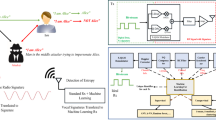Abstract
Application of Mobile Agents in MANET is growing day by day to solve various network and user related problems in more efficient manner. However, before mobile agent’s viable use in MANET, major performance issues such as reliability of Mobile Agent based System need to pay attention. Reliability of a mobile agent can be defined as its success ratio to fulfill its objective. MANET may have some malicious nodes which can affect the reliability of Mobile Agent based System (MAS). To overcome this issue, mobile agent should have some mechanism to find out the presence of these malicious nodes in MAS. Owner host node of Mobile Agent prepares the list of nodes the mobile agent required to visit to fulfill its task. This node list needs to be updated to remove the malicious nodes from the node list. Also, selection of suitable migration policy of agents is also necessary to ensure reliable Mobile Agent based System. This paper focuses on the enhancement of node list, selection of migration policy and MAS reliability based on reinforcement learning. This method helps mobile agent to learn about a preferred policy for selecting a suitable migration pattern and detecting malicious nodes present in the MANET. To measure the reliability of learning mobile agents, a Monte Carlo simulation based algorithm is proposed. Obtained results verifies that the learning of mobile agents contributes towards better reliability of MAS in suspicious MANET.





Similar content being viewed by others
References
Mishra PK, Singh R (2014) A survey on reliability estimation techniques for mobile agent based systems. Int J Adv Comput Res 4(1):123
Kotz D, Gray RS (1999) Mobile agents and the future of the internet. Oper Syst Rev 36:76–85
Sutton RS, Barto AG (1998) Reinforcement learning:an introduction. MIT Press, Cambridge
Kaelbling LP, Littman ML, Moore AW (1996) Reinforcement learning: a survey. J Artif Intell Res 4:237–285
Tokic M (2010) Adaptive ɛ -greedy exploration in reinforcement learning based on value differences. KI 2010. Adv Artif Intell 6359:203–210
Mishra PK, Singh R, Yadav V (2016) A hierarchical model for reliability estimation of mobile agent based systems. Int J Softw Web Sci (IJSWS) 1(16):10–15
Mooney CZ (1997) Monte carlo simulation, vol 116. Sage Publications, Thousand Oaks
Rooryck M (1983) Modelling multiple path propagation- application to a two ray model. J LOnde Electr 63:30–34
Bettstetter C (2001) Smooth is better than sharp: a random mobility model for simulation of wireless networks. In: 4th ACM international workshop on modeling, analysis and simulation of wireless and mobile systems, pp 19–25
Cook JL, Ramirez-Marquez JE (2008) Mobility and reliability modeling for a mobile ad-hoc network. IIE Trans 41:23–31
Author information
Authors and Affiliations
Corresponding author
Rights and permissions
About this article
Cite this article
Mishra, P.K., Singh, R. & Yadav, V. Reliability assessment of mobile agent based system in suspicious MANET. Int. j. inf. tecnol. 9, 209–214 (2017). https://doi.org/10.1007/s41870-017-0017-8
Received:
Accepted:
Published:
Issue Date:
DOI: https://doi.org/10.1007/s41870-017-0017-8




